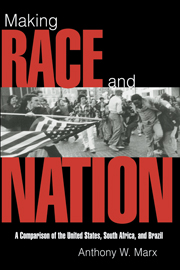Book contents
- Frontmatter
- Contents
- Preface and Acknowledgments
- 1 Introduction
- Part One Historical and Cultural Legacies
- Part Two Racial Domination and the Nation-State
- Part Three Race Making from Below
- 8 “We Are a Rock”
- 9 Burying Jim Crow
- 10 Breaching Brazil's Pact of Silence
- Comparative Overview
- 11 Conclusion
- Notes
- Bibliography
- Index
Comparative Overview
Published online by Cambridge University Press: 05 June 2012
- Frontmatter
- Contents
- Preface and Acknowledgments
- 1 Introduction
- Part One Historical and Cultural Legacies
- Part Two Racial Domination and the Nation-State
- Part Three Race Making from Below
- 8 “We Are a Rock”
- 9 Burying Jim Crow
- 10 Breaching Brazil's Pact of Silence
- Comparative Overview
- 11 Conclusion
- Notes
- Bibliography
- Index
Summary
Black protest relates to nation-state consolidation built through racial domination; the state-led process of race making proves to be doubleedged. Official policies of exclusion according to race have drawn boundaries solidifying subordinated racial identity, which then forms a basis for collective action in response to shifting state policies. Such identity formation is prior to and necessary for the logic of resource allocation and political opportunities to produce social movements. Formal exclusion so defines and unifies who is subordinated, building on past solidarity and inviting pressure for inclusion. Racial domination thus punished its victims, but also reinforced and legitimized racial identity and protest, by which subordination could be and has been challenged to gain the expected rewards of formal inclusion. The relative lack of such legal racial domination, as in Brazil, appears less hurtful in a direct sense, but also constrains the prospect for racial identity, mobilization, and redress even when cultural and informal discrimination still provide some basis for racial identity and protest.
This general argument is affirmed by the linkage between levels of racial domination and of identity consolidation and protest responses. The South African state, founded after the Boer War and strengthened by British support, inflicted early, pervasive, and nationwide segregation. Opposing racial identities and efforts at protest emerged quickly, gaining strength over time. In the United States Jim Crow was established locally while the central authority remained weak and withdrew.
Information
- Type
- Chapter
- Information
- Making Race and NationA Comparison of South Africa, the United States, and Brazil, pp. 264 - 266Publisher: Cambridge University PressPrint publication year: 1997
